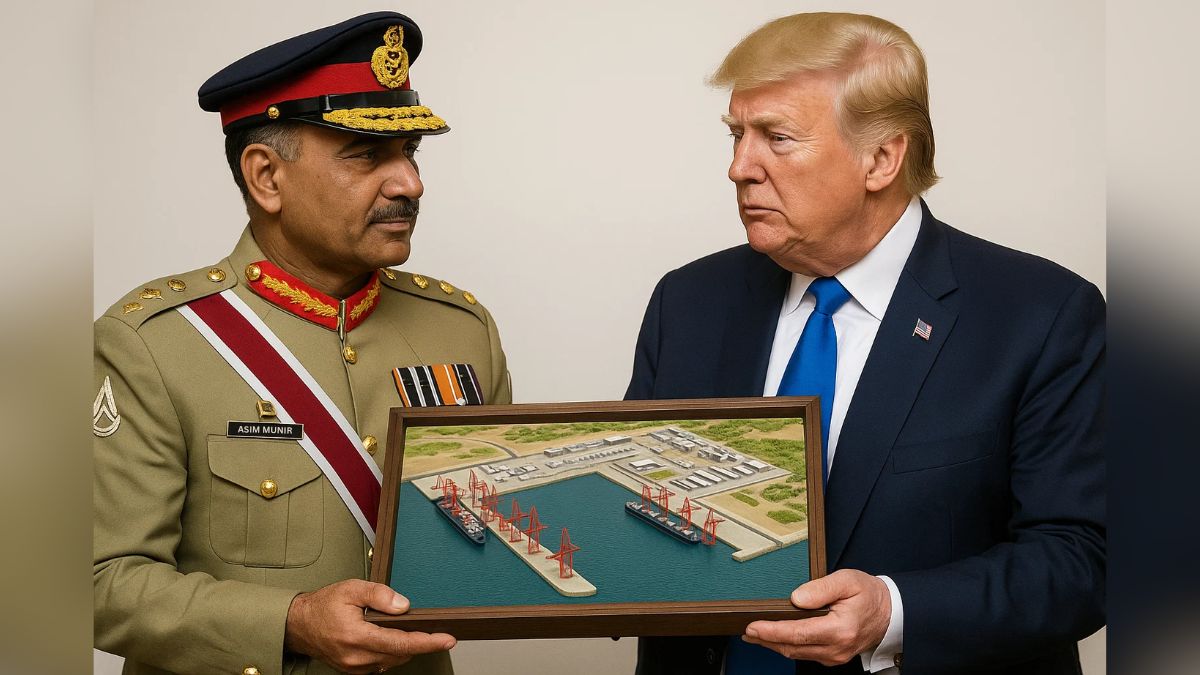Advisers to Pakistan’s army chief, Field Marshal Asim Munir, have reportedly pitched a proposal to Washington to build and operate a port at Pasni on the Arabian Sea. If realised, the move would give the United States (US) a strategic foothold just 70 miles from China’s Gwadar port.
According to a report in the Financial Times, the plan would transform the small fishing town of Pasni into a logistics and export hub for Pakistan’s critical minerals, including copper and antimony, vital to global battery, fire-retardant, and missile production supply chains. Pasni lies roughly 100 miles from Iran and could, in theory, serve as a counterweight to Beijing’s growing maritime presence in the region.
What does the Pasni proposal seek to achieve?
The proposal was reportedly shared with Field Marshal Munir ahead of his White House meeting with President Donald Trump last month, though a senior US official later clarified it had not yet reached the president or his national security advisers.
Still, the pitch shows Islamabad’s attempt to reset ties with Washington after years of strain. It forms part of Paksitan’s wider effort to woo Trump, which includes counterterrorism cooperation, potential participation in Trump’s Gaza peace plan, and the export of critical minerals to US companies.
Missouri-based US Strategic Metals (USSM) has already signed an MoU with Pakistan’s military engineering corps to source minerals from the country. USSM’s commercial director, Mike Hollomon, said, “In our conversations with the field marshal, he stressed that Pakistan has been an ally of the US for a long time and minerals is a way to rekindle a dormant friendship.”
Pakistan has already shipped a small trial consignment of nearly two tonnes of copper, antimony, and neodymium to USSM. Hussain Abidi, chair of the Pakistan Council of Scientific and Industrial Research, described the move as “a reset with America through economic ties rather than just the traditional security ties.”
How would Pasni alter the strategic balance with China?
The proposed $1.2 billion project includes plans for a railway linking Pasni to Reko Diq, one of the world’s largest undeveloped copper-gold mines. The plan proposes mixed funding from Pakistan’s federal government and US-backed development finance institutions.
The blueprint explicitly references China’s Gwadar port, flagging “dual-use concerns” about Beijing’s Belt and Road Initiative — a veiled warning that Gwadar could be used for military purposes, something both Islamabad and Beijing deny.
Supporters argue that Pasni could help Pakistan balance relations between China and the West, offering the US a logistical alternative in a region where Chinese infrastructure dominates.
What does the “Munir–Trump bromance” reveal about Pakistan’s democracy?
Since May, relations between Field Marshal Munir and Trump have warmed considerably, with Pakistani leaders publicly praising the US president for mediating a ceasefire with India after Operation Sindoor.
White House photographs from their meeting last month showed Field Marshal Munir and Prime Minister Shehbaz Sharif presenting Trump with an open wooden box containing colourful stones — believed to be mineral samples from Pakistan’s resource-rich western provinces.
The Pasni port project, ostensibly about trade and minerals, is in fact a message about control: that the military, not civilians, still sets the course of Pakistan’s foreign and economic policy. It is interesting to note that the report of the proposal made by Field Marshal Munir’s adivsers came days ahead of October 12 anniversary of Pakistan’s most recent military coup carried out by Pervez Musharraf in 1999.
Musharraf’s 1999 coup introduced what became Pakistan’s governing formula: “controlled democracy.” Civilians govern in appearance, while the army ensures outcomes. That arrangement survived even after Musharraf’s fall.
Imran Khan’s 2018 rise bore the army’s quiet endorsement; his 2022 ouster came with its withdrawal. Every prime minister since has walked the same tightrope — beholden to the establishment, yet occasionally sacrificed to maintain its primacy.
Under Field Marshal Munir, the choreography continues. The army influences everything from trade and mining to counterterrorism and diplomacy. The Pasni port proposal is merely the latest iteration of the army’s foreign policy freelancing — reminiscent of Musharraf’s post-9/11 pivot toward Washington, when Pakistan exchanged strategic cooperation for Western aid.
What is the cost of this control?
No civilian prime minister has ever completed a full term. Governance remains paralysed, investment insecure, and social indicators stagnant. When the military dominates decision-making, institutions atrophy and accountability disappears.
Munir’s attempts to court Washington echo his predecessors’ logic — that the army must remain indispensable to Pakistan’s survival. Yet each such outreach only deepens the imbalance between the barracks and the ballot.
Until power genuinely shifts from the cantonment to the parliament, Pakistan’s democracy will remain an elaborate performance. Its civilians may govern by law, but its generals still rule by habit.
